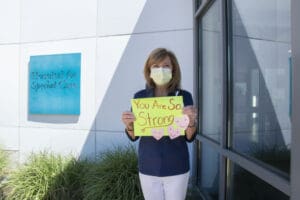 Hospital For Special Care (HFSC) President and CEO Lynn Ricci, FACHE spoke with MetroHartford Alliance Content Manager Nan Price about Connecticut’s healthcare workforce pipeline and how the industry has been impacted by the COVID-19 pandemic.
Hospital For Special Care (HFSC) President and CEO Lynn Ricci, FACHE spoke with MetroHartford Alliance Content Manager Nan Price about Connecticut’s healthcare workforce pipeline and how the industry has been impacted by the COVID-19 pandemic.
NAN PRICE: Give us an overview about what makes Hospital for Special Care unique in our region.
LYNN RICCI: Hospital for Special Care is licensed as a chronic disease hospital, otherwise known by the federal government as a long-term acute care hospital. We’re a resource to hospitals across the state and beyond.
We are one of only two hospitals in the country to serve both pediatric and adult patients at our level of care. Our pediatric programs help children with complex medical issues mostly related to challenges at birth, congenital conditions, or sometimes related to accidents or injuries that have occurred after birth.
Our autism service continuum is unique not only in the state, but across the country. Through that, we offer services at outpatient, partial hospital, and inpatient levels of care—and the need for services is incredibly high. HFSC also does a lot of research at the hospital, including research related to autism focused on documenting and sharing best practices.
We have what’s called a patient-centered specialty practice, which is a designation from the National Committee on Quality Assurance that nobody else in the country working in the autism space has earned. Our commitment to interdisciplinary care focused on the patient’s needs and strengths extends beyond autism to our other neuroscience programs including neuromuscular care, brain/health and injury programs, neurobehavioral, and neuropsychology services. Whether we’re caring for patients with amyotrophic lateral sclerosis (ALS), Parkinson’s disease or muscular dystrophy, we’re focused on providing integrated care.
You can see the benefits of that approach in our neurobehavioral approach for patients living with brain injury who are struggling in the community. In this longer-term program, the team prepares each patient for a successful return to the community and helps wrap the services and supports they need around them. Our patients have a more than 90% success rate in safely returning to and staying in the community.
The other thing that makes us unique to the healthcare sector is we’re a very close partner with the state in terms of serving patients eligible for Medicaid. HFSC probably has the highest Medicaid population of any hospital in the state, whether it be acute or long-term care.
Several HFSC employees, including me, are involved in a number of Medicaid innovation groups. We work very closely with the state around looking at policies and payment practices related to Medicaid so we can deliver the highest quality, lowest cost care with the best outcomes.
NAN: How would you say healthcare is an economic driver here in Connecticut?
LYNN: As an employer, HFSC has just over 1,200 employees. We’re one of the largest employers in New Britain. We employ folks not only from our direct community, but we happen to be on a bus line, which is a great resource to folks who are coming in at an entry level and working in some of our surface level environments, like housekeeping and food service. We also draw from across the state in terms of our professional populations.
And we’ve created great partnerships with local academic institutions, which helps to build a pipeline. For example, in autism, we worked with psychology fellows at Yale University and the University of Connecticut.
Because we’re large and have such diverse programs, HFSC works to cultivate our workforce by providing a tremendous number of training opportunities. We also work closely with workforce development at a very early level.
For example, we collaborate with the Opportunities Industrialization Center (OIC), a nonprofit adult education and job training organization that works with kids in the community who are at risk to help ensure that they establish a career path and a way to make a living. HFSC is also one of the early partners with the New Britain High School Health Academy. We help provide experiences for students at all levels in the organization, hoping to bring them in at an entry level job in healthcare and then continue to support them.
There’s a lot of competition for folks in healthcare, so we want to ensure that we keep the great talent Connecticut has in Connecticut, because obviously healthcare is fiercely competitive right now and folks have a lot of portability with the roles that they have.
From a broader perspective, I think HFSC brings Connecticut to the national level for our level of care. We’re unique here in our home state and a leader in the industry overall. I serve on our industry national board. Many of us do a lot of policy-related work in Washington, D.C. around ensuring that Connecticut stays on the forefront in terms of healthcare-related issues.


LYNN: Our level of care was able to provide relief to the acute care hospitals during the pandemic. Early on, we were very responsive in terms of lending out our expertise and resources, including equipment like ventilators. We can have as many as 100 patients on a ventilator here at our hospital. We were able to share our inventory of back-up resources with intensive care units around the state without impacting our own patient care.
HFSC also opened a COVID-19 recovery unit and we became a pipeline to move patients through so sicker patients could be brought into the acute care environment. We now have a program for those patients to continue their recovery, especially recovery from long-term COVID-19 on an outpatient basis.
We’ve also worked hard to reopen the pipeline for students coming into the hospital. So, we have students studying respiratory, physical therapy, and occupational speech therapy; nursing students; doctoral level of students; fellows; and residents coming through our hospital and we provide them with a lot of experience.
We’ve had to look at how we use technology in healthcare. Obviously, telehealth became an important way of providing a continuum of care during the pandemic. And we continue to utilize telehealth. We see a lot of patients who require very close monitoring, so we use a system that’s called Avasure It’s uses a camera to monitor a patient within the hospital without requiring someone to be bedside.
I think we’ve learned that technology is critical in helping us solve some of our workforce-related issues. For example, looking at how we can use centralized monitoring to care for patients safely, but with fewer human resources and more reliance on technology.
We recently rolled out another level of technology called knowledge-based medication administration, which helps us streamline the way our nurses document and deliver medications to patients in a way that is less reliant on a manual process and more reliant on technology.
Also, we’re working on connecting our patients to their families. Knowing that patients are here long-term in some cases, we’ve had to be very creative in how we allow the community back in. We use technology to keep patients in touch with their families when they can’t be here in person. So, COVID-19 has taught us a lot about being nimble and responsive and making changes very quickly because it’s such a changeable environment.
With regard to our employee base and how that’s changed, I think that’s probably the largest impact COVID-19 has had on us as a provider. I’m on the Connecticut Hospital Association Board and all of us in Connecticut as providers are working to understand how the world has changed for people who are delivering care—both in terms of the options they have to work outside of our hospital and in terms of the kind of support and resources they need to be able to do their job effectively. We give them a voice at the bedside through a concept called unit-based councils, which allows them to help to drive the changes on their units—they really are the experts in what happens at the patient bedside.
One of the things we did during COVID-19, knowing that so many people—even those who kept their jobs—were financially impacted, was to create a financial assistance program for employees. It was initially funded through our leadership teams’ donations and has continued to be funded by employees helping other employees.
Through this program, our employees can submit an application to receive financial support that doesn’t come from the operation of the organization, but first from the generosity of the leadership team and now from the generosity of their peers. That’s been a very tangible way of supporting folks who had a lot of financial stress during the pandemic.
Learn more about Hospital for Special Care
hfsc.org | Facebook | Instagram | LinkedIn | Twitter | YouTube
